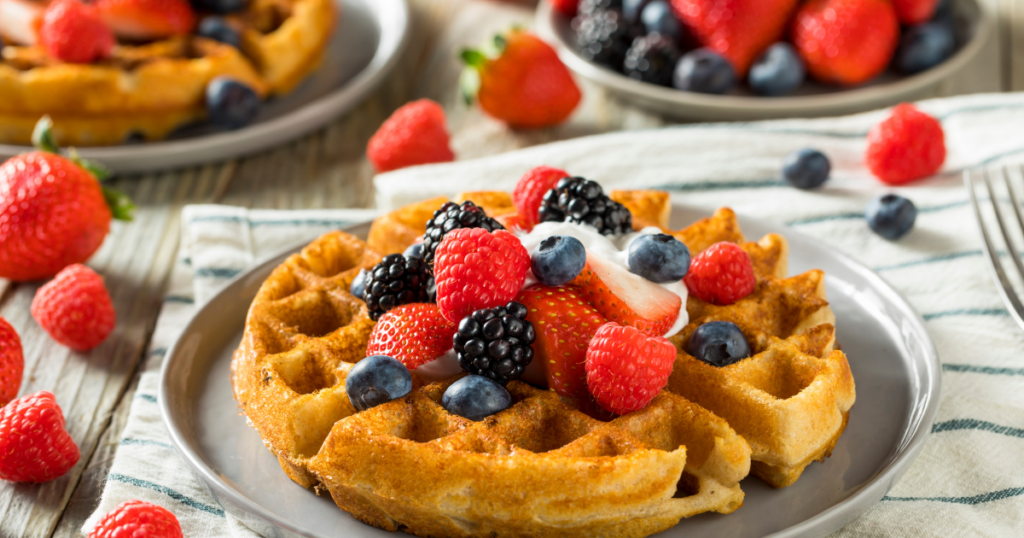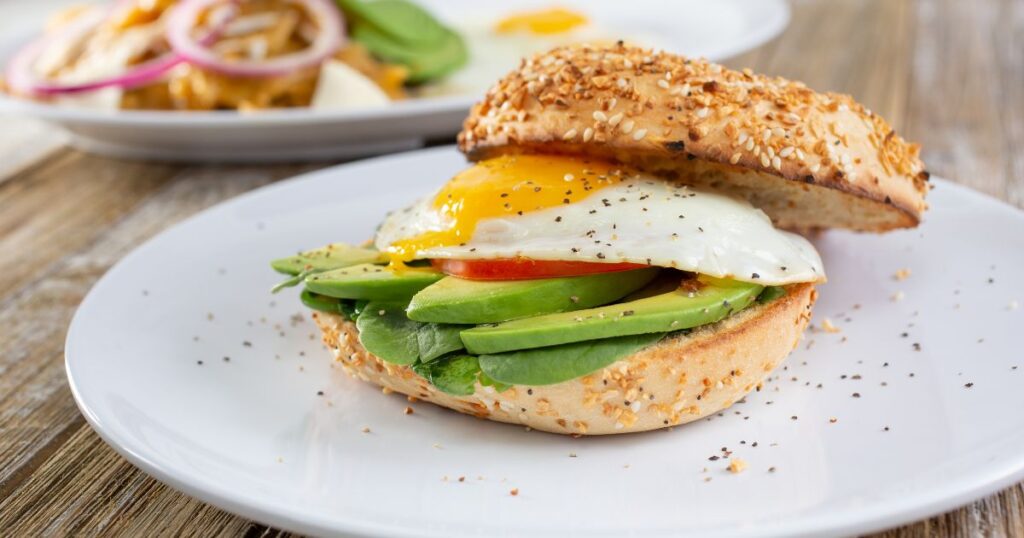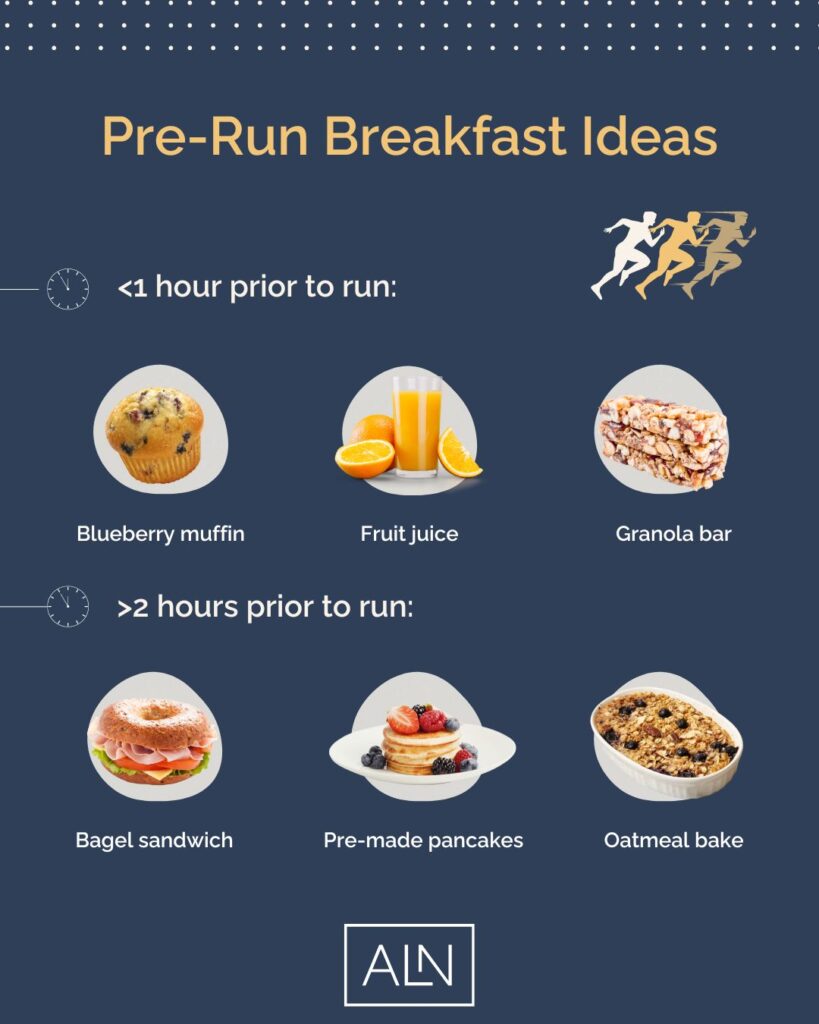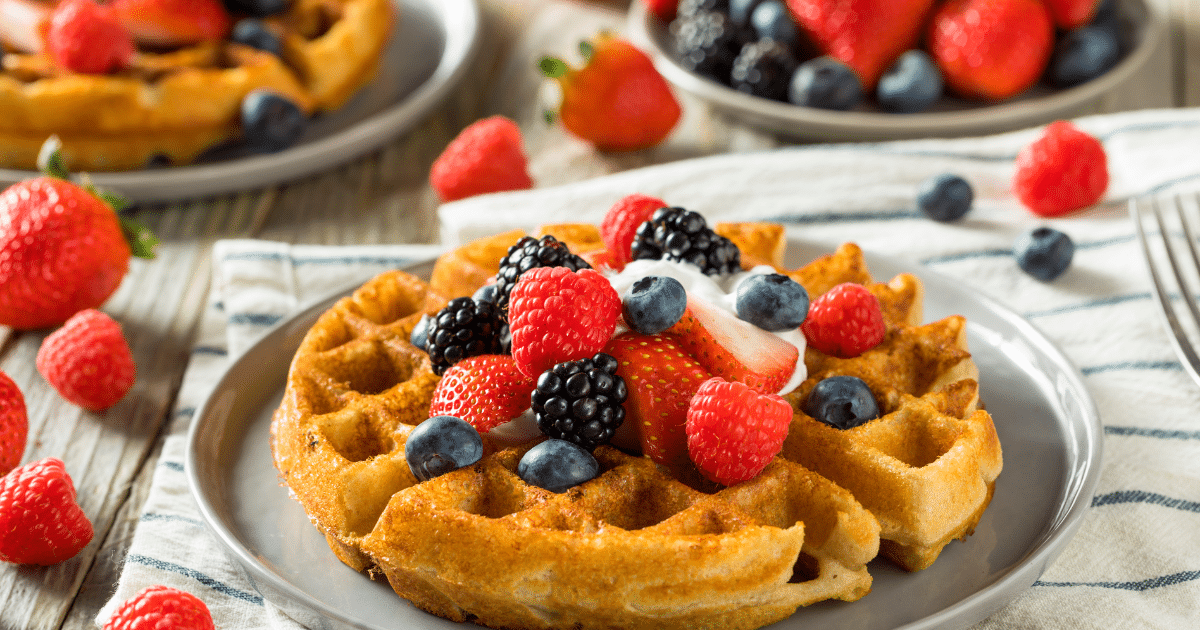RUNNING →
Level Up Your Nutrition Game With Our Freebies
Alex
I provide nutrition coaching for endurance athletes to improve performance and body composition through a simple and flexible eating style.
Hi, I'm
ATHLETE EATING GUIDE →
PROTEIN →
TRIATHLON →
RECIPES →
PERFORMANCE NUTRITION →
SUPPLEMENTS →
HOLIDAY & TRAVEL →
PLANT-BASED →
FEMALE ATHLETE NUTRITION
Explore the Blog
LEARN MORE →
ATHLETE GROCERY SHOPPING GUIDE →
RACE DAY: TRIATHLON NUTRITION PLANNER →
READY TO FUEL?
incredible value!
The fueling guide bundle serves as your one-stop-shop for strategies to fueling before, during and after your workouts.
ENDURANCE EATS
BINGE-WATCH READY!
YOUTUBE SERIES
So often we hear that breakfast is the most important meal of the day. While breakfast provides countless benefits, there is no singular meal that is more important than the others. Though if you are an endurance athlete, eating breakfast before running is a vital way to boost your performance. Let’s discuss the vast benefits of breakfast and how to plan a fabulous and nourishing meal to fuel those miles ahead!
The Benefits of Breakfast Before Running
The benefits of breakfast are in its name as you are quite literally “breaking the (overnight) fast.” While you sleep, your body continuously utilizes glycogen (stored carbohydrate) to maintain normal physiological processes. This means when you wake from your overnight slumber, your glycogen gas tank may be near empty. Eating breakfast before running is an important start to fuel your day and those miles ahead. In addition, breakfast provides other key benefits such as:
- Boosts energy levels for performance
- Supports muscle recovery and growth
- Enhances mental focus and concentration
- Helps offset extreme hunger and controls appetite throughout the day
- Stabilizes blood sugar levels and mitigates subsequent cravings during the day
If you are skimping on breakfast before running regularly, you will risk performance benefits. Underfueling before running can lead to inadequate nutrient intake, and an overall decrease in energy levels throughout the day. Chronic fatigue and a decrease in performance in workouts and in racing are also common. Long-term consequences of underfueling include injury and RED-S.
Common signs and symptoms of underfueling can range in severity. When athletes are not fueling prior to those morning miles, they may experience constant hunger, fatigue and irritability throughout the day. Hunger pangs while running, gastrointestinal distress, and muscle cramps can also be unwanted side effects of underfueling.
Many runners are unintentionally guilty of underfueling at breakfast which is often due to lack of planning and preparing ahead. Fortunately breakfast before running does not need to be elaborate or glamorous. Let’s review what to include to fuel those miles.

Carbohydrates are Premium Fuel for Pre-Run Breakfasts
Carbohydrates are premium fuel when it comes to filling your nutrition tank because carbohydrates are the body’s favorite, most efficient, source of energy. When you consume carbohydrates, your body breaks the food into glucose (sugar) and either uses it for activity (i.e. an upcoming run) or converts into glycogen to be used later. It is important to recognize that not all carbohydrates are the same. Though depending on how much time you have before you run, you may consume both simple and complex carbohydrates for fuel. When planning your breakfast before running, consider the following:
Simple Carbohydrates
Simple carbs are easy-to-digest and are found in raw sugar, energy gels, energy or sports drinks, fruit and fruit juices, soda, candy, and foods with added sugars such as cookies and desserts. Foods that are high in simple carbohydrate content are low in dietary fiber and break down quickly to be used as energy. These foods are fantastic to include in your breakfast before running to provide a quick source of energy. Particularly if you are short on time, simple carbohydrate-rich food and beverages are easiest to digest.
Complex Carbohydrates
Complex carbs take longer to digest and are found in higher fiber, nutrient-dense foods such as whole grains (barley, brown rice, quinoa, oats), legumes including beans and lentils, starchy vegetables such as sweet potatoes and pumpkin, among others. These foods are excellent to include throughout the day in meals and snacks to boost your vitamin and mineral intake and help keep you feeling satisfied. However, if you have a sensitive stomach, you may want to caution higher-fiber foods in your breakfast before running. Then be sure to include complex carbohydrate sources at other meals and snacks during the day.
Hydration Considerations for Before Your Morning Run
Plain and simple, hydration is essential pre-run. A dehydrated athlete is not a well-performing athlete. Science has shown us that staying hydrated can have many overall benefits for athletes. Benefits of hydration for athletes include:
- Reduces fluid loss
- Improves cardiovascular outcomes such as a decrease in heart rate and maintaining blood volume
- Delays the onset of fatigue
- Prevents dehydration-associated injuries
- Lessens risk of heat stroke, stress, or illness
Additionally, hydration can be beneficial for other aspects of your health:
- Improves sleep quality
- Improves mood and cognition
- Prevents infections and illnesses
- Lubricates joints
- Keeps organs functioning properly
While hydration is important any time of the day, ideally you want to aim for 16oz of fluids 1-2 hours prior to your run or training session. Including carbohydrate and electrolyte-rich fluids at your breakfast before running can be an easy way to meet fluid, carbohydrate and electrolyte goals. Be sure to review our blog post on a few of our favorite sports drink beverages.
Pre-Run Breakfast Ideas
Repeat after me– glamorous is not always better. Your breakfast before running does not need to be overwhelmingly elaborate or fancy. Sometimes, a seemingly ordinary breakfast truly is better and well-tolerated. Also, it is always important to consider cultural and personal preferences when planning your pre-run eating routine. With that said, drumroll please. My team and I have a few favorite breakfast go-to options which include:

Less than 1 hour prior to run:
- Toast or bagel with jelly
- Large glass of fruit juice or Nuun Endurance
- Blueberry muffin or a slice of homemade banana bread
- A Bobo Bar, Picky Bar, or Maurten 225 bar. Here’s a few more of our dietitian team energy bar favorites
- Flour tortilla with honey
- Fruit smoothie
- Graham cracker and applesauce pouch
- Your kid’s granola bar or snack crackers (my lips are sealed)!
The above options are quick and easy-to-digest. Though do remember, the longer the workout, the more carbohydrates you will need. In that case, you may want to plan accordingly and allow yourself more time to digest these options:
2 hours or more prior to run:
- A serving of our favorite oatmeal bake and a side of Greek yogurt
- Toaster waffles drizzled with almond butter and jelly
- Cream of rice cereal with honey and glass of Skratch hydration beverage
- Bagel sandwich with an egg, sliced turkey and side of fruit
- Pre-made pancakes topped with maple syrup and a glass of Tailwind
- Homemade granola or cereal with milk or plant-based milk alternative and toast with sunflower seed butter
Please also note that exact serving sizes vary depending on each individual athlete.

Timing Your Breakfast Before Running
Each athlete is also very different in timing of a pre-run meal. Many athletes that I work with have historically avoided breakfast altogether before running. Mostly in fear of unwanted gastrointestinal issues. However, practicing your breakfast before running routine is one of the easiest ways to train your gut over time.
It is absolutely okay to start small when you are adding breakfast into your morning routine. Even if this means ½ glass of fruit juice. Once you better determine what foods and beverages your body tolerates, then experiment with boosting the volume. If you have never been a breakfast eater, allow yourself more time to digest, if able. Unfortunately this may mean setting your dreaded morning alarm even earlier.
Avoiding Common Pre-Run Breakfast Mistakes
When I work with athletes to nail down a set breakfast before running routine, typically we discuss the following:
- Avoid too much fat, protein, and fiber. All of these nutrients take longer to digest and may make your stomach feel uncomfortably full. Save your egg burrito or protein-rich breakfast for enjoyment after you log those miles.
- Pass on foods with sugar alcohols such as mannitol, erythritol, sorbitol, maltitol, xylitol, lactitol, and isomalt. Also consider avoiding artificial sweeteners including aspartame and sucralose which may precipitate unwanted stomach discomfort. These ingredients can sneak into energy bars, lower calorie yogurts, and even juices.
- With enough practice and patience (which can be the hardest part), avoid eating too much or too little. You know your body best and working with a sports dietitian can better help you determine the correct amount pre-run.
- Cardinal sports nutrition rule- avoid trying any new foods or routines on race day. Stick with what is tried and true for you. For some athletes, that means sticking with a good ‘ol peanut butter and jelly sandwich every single morning. That is absolutely okay!

Tips for Preparing Breakfast Before Your Run
If you are a particularly early riser in hopes to beat the heat, preparing breakfast the evening before may be advantageous. Some athletes also commit an hour or two on the weekend to meal prepping for the week. A couple strategies to make breakfast before running easier include:
- Set out breakfast ingredients the evening prior. If you are opting for an easy applesauce pouch or energy bar, place the items right next to your running gear. This way you do not easily forget when that painfully early alarm goes off!
- Make the complete meal ahead of time; perhaps the evening before your run. This is typically more applicable with a few of our pre-run favorites, oatmeal bake and pancakes. Waffles, cream of rice, granola, and other food options are easy to prepare in advance as well.
Putting It Together
As an endurance athlete with many adventures ahead, breakfast needs to be a non-negotiable part of your daily routine. If you are new to the breakfast game, be sure to experiment with many different options to see what works best for you. Once you fine tune your breakfast routine, stick with it. If you are having a difficult time putting the pieces of the breakfast puzzle together, be sure to reach out. Working with a sports dietitian can boost your breakfast game in no time!
Alex
I provide nutrition coaching for endurance athletes to improve performance and body composition through a simple and flexible eating style.
Hi, I'm
LEARN MORE →
take the quiz!
Let's discover your Endurance Nutrition IQ
How well do you know your fueling? Answer these questions and let's see where your endurance nutrition knowledge is at!
Take the quiz
level up your nutrition game with these freebies
free downloadS
Protein-Packed 10-Day Sample Meal Plan
Athlete Eating Guide
Athlete Grocery Shopping Guide
1
2
3
Inspiration to fit 120 grams of protein into your day
Planning what goes on your plate
Putting the right foods in your grocery cart
